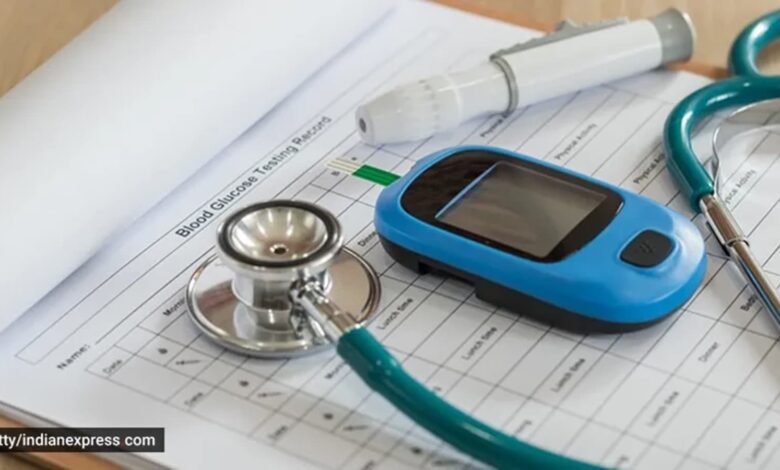What happens to blood glucose levels when you snack late at night?

Digital content creator Justin Richard — a Type 1 diabetic — has been trying to avoid Type 2 diabetes that “runs in his family”. As such, he uses a blood glucose monitor to measure the impact of his diet on his sugar levels, the results of which he shares on Instagram. In one such post, he demonstrated how late-night snacking spiked his blood glucose levels. “There was a minute spike in my blood sugar levels post dinner. But later that evening, I decided to watch a movie. And I also decided to eat an entire bag of caramel-coated popcorn,” said Richard.
Consequently, he noticed a “big spike” in his blood glucose levels. What’s worse? “After I watched the movie and had the popcorn, I decided to go to bed,” said Richard, who also observed how the blood sugar levels remained high all through the night. “This is really bad. This is typically the case for me when I eat high carbohydrates, in particular, refined carbohydrates late at night before going to bed. It really has a bad impact on my blood sugar levels simply because my body is at a rested state and doesn’t have the opportunity to burn off those calories,” added Richard, further sharing that it is a lesson for him to “stop eating refined carbohydrates late night bed bed”. “I want to give myself 3-4 hours to digest any food before I go to sleep,” he continued.
But what exactly happens to your blood glucose levels when you snack late at night?
Story continues below this ad
Dr Veena Pai, dietitian, Lilavati Hospital, Mumbai said that the body’s sensitivity to insulin, a hormone responsible for regulating blood glucose levels, can decrease as the day progresses. “This means that when you eat unhealthy junk food or snacks late at night, your body may not effectively process the carbohydrates and sugar in them. Snacks like chips, popcorn, and candies can trigger blood sugar levels as they are high in cholesterol, carbohydrates, sodium, added sugar, preservatives, and additives,” said Dr Pai.
Refined foods can spike your blood glucose levels (Source: Pexels)
Concurring, Dr Hridish Narayan Chakravarti, consultant, diabetology and endocrinology at Narayana Hospital said that eating late at night, especially when your body’s natural insulin sensitivity is lower, can cause your blood glucose levels to rise more than they would during the day. “When you consume food, particularly snacks high in sugars or simple carbohydrates, your body breaks down these foods into glucose, which then enters your bloodstream,” said Dr Chakravarti.
In simple words, this happens because your body’s circadian rhythm, which regulates various physiological processes, slows down metabolism in the evening. “As a result, your body isn’t as efficient at processing glucose, leading to higher blood sugar levels that can linger overnight,” said Dr Chakravarti.
Over time, frequent late-night snacking can contribute to insulin resance, weight gain, and an increased risk of developing type 2 diabetes. According to Dr Pai, it can also lead to durbances in sleep, high blood pressure, high blood glucose levels, and cardiovascular problems too.
To maintain stable blood glucose levels, experts suggest it’s best to avoid eating late at night or opt for snacks that are low in sugar and high in fibre, which can help regulate glucose levels effectively. “To manage blood sugar levels one should strictly avoid eating late-night snacking. You could eat in small portion sizes to avoid overeating. In case of late-night snacking or dinners, make sure you go for a long walk to burn off those refined calories that can spike up your blood glucose levels,” said Dr Pai.Story continues below this ad
Managing your eating habits in this way supports better overall health and reduces the risk of long-term complications, added Dr Chakravarti.
DISCLAIMER: This article is based on information from the public domain and/or the experts we spoke to. Always consult your health practitioner before starting any routine.







